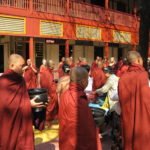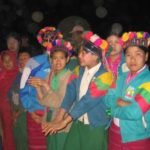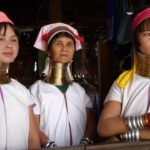Myanmar
| Capital: | Naypyidaw Largest city – Yangon (Rangoon) |
| Area: | 676,578 sq kms |
| Population: | 50,020,000 |
| Languages: | Burmese, Jingpho, Kayah, Karen, Chin, Mon, Rakhine, Shan |
| Time: | MST (UTC+6:30) |
| Currency: | kyat (K) (mmK) |
Burma, which has a total area of 678,500 square kilometres (262,000 sq mi), is the largest country in mainland Southeast Asia, and the 40th-largest in the world.
It is bordered to the northwest by Chittagong Division of Bangladesh and Mizoram, Manipur, Nagaland and Arunachal Pradesh of India to the northwest. It shares its longest borders with Tibet to the north and Yunnan of China to the northeast for a total of 2,185 kilometres (1,358 mi). It is bounded by Laos and Thailand to the southeast. Burma has 1,930 kilometres (1,200 mi) of contiguous coastline along the Bay of Bengal and Andaman Sea to the southwest and the south, which forms one quarter of its total perimeter. The Irrawaddy Delta, which is approximately 50,400 km2 (19,460 sq mi) in area, is largely used for rice cultivation.
In the north, the Hengduan Shan mountains form the border with China. Hkakabo Razi, located in Kachin State, at an elevation of 5,881 metres (19,295 ft), is the highest point in Burma. Three mountain ranges, namely the Rakhine Yoma, the Bago Yoma, and the Shan Plateau exist within Burma, all of which run north-to-south from the Himalayas. The mountain chains divide Burma’s three river systems, which are the Ayeyarwady, Salween (Thanlwin), and the Sittaung rivers. The Ayeyarwady River, Burma’s longest river, nearly 2,170 kilometres (1,348 mi) long, flows into the Gulf of Martaban. Fertile plains exist in the valleys between the mountain chains. The majority of Burma’s population lives in the Ayeyarwady valley, which is situated between the Rakhine Yoma and the Shan Plateau.
Climate
Much of the country lies between the Tropic of Cancer and the Equator. It lies in the monsoon region of Asia, with its coastal regions receiving over 5,000 mm (196.9 in) of rain annually. Annual rainfall in the delta region is approximately 2,500 mm (98.4 in), while average annual rainfall in the Dry Zone, which is located in central Burma, is less than 1,000 mm (39.4 in). Northern regions of the country are the coolest, with average temperatures of 21 °C (70 °F). Coastal and delta regions have mean temperatures of 32 °C (89.6 °F).
The country’s slow economic growth has contributed to the preservation of much of its environment and ecosystems. Forests, including dense tropical growth and valuable teak in lower Burma, cover over 49% of the country. Other trees indigenous to the region include acacia, bamboo, ironwood, mangrove, michelia champaca coconut and betel palm and rubber has been introduced. In the highlands of the north, oak, pine and various rhododendrons cover much of the land. The lands along the coast support all varieties of tropical fruits. In the Dry Zone, vegetation is sparse and stunted.
Typical jungle animals, particularly tigers and leopards, occur sparsely in Burma. In upper Burma, there are rhinoceros, wild buffalo, wild boars, deer, antelope, and elephants, which are also tamed or bred in captivity for use as work animals, particularly in the lumber industry. Smaller mammals are also numerous, ranging from gibbons and monkeys to flying foxes and tapirs. The abundance of birds is notable with over 800 species, including parrots, peafowl, pheasants, crows, herons, and paddybirds. Among reptile species there are crocodiles, geckos, cobras, Burmese pythons, and turtles. Hundreds of species of freshwater fish are wide-ranging, plentiful and are very important food sources.
Visa
MYANMAR EMBASSY
19 A Charles Street,
LONDON – W1J 5DX
Tel: 020 7499 4340, 7493 7397,
Fax: 020 7409 7043, 7493 9649
Website: www.mofa.gov.mm/myanmarmissions/uk.html
Visa Requirements
Visa for Myanmar ( Burma ) are now available online please visit https://evisa.moip.gov.mm/
Local laws and customs
You should respect religious custom when visiting Budhist religious sites – shorts and sleeveless tops will cause offence and shoes and socks should be removed before entering a pagoda or monastery.
Penalties for drug trafficking range from a minimum sentence of 15 years imprisonment and can include the death penalty.
Homosexuality is illegal in Burma. In June 2007, a European National was sentenced to seven years in prison for committing homosexual acts.
Currency
We recommend visitors to bring US Dollar in cash only – larger notes receiving a better rate in exchange. Exchange of other foreign currencies such as Euros, Yen and Pounds Sterling are maybe time consuming and difficult. Authorized money changer throughout Myanmar will usually only accept US Dollars. The FEC (Foreign Exchange Currency) used in Myanmar as currency next to the local currency Kyat (pronounced “Chat”) is equal to the US Dollar (1=1) and can easily been used for payment of purchases throughout the country.
Local currency is Kyat. The monetary unit of Myanmar is the ” Kyat ” which is divided into 100 pyas. Currency notes are available in denominations of Kyats 5000, Kyats 1000, Kyats 500, Kyats 200, Kyats 100, Kyats 50, Kyats 20, Kyats 10, Kyats 5, Kyat 1.
Customs Authority
Your valuables ( jewelry, cameras, electronic equipment, etc.) should be declared on your customs declaration form upon arrival. Receipt of purchase and an export permit voucher for locally bought goods such as gems and jewelry may be required upon departure.
Theoretically, tourists who have brought foreign currencies in excess of US $2,000 are required to declare. You might want to declare your still/video cameras, computer, jewelries, and electronic goods so that you can officially claim of your lost or theft during your trip although it is hardly happens.
Possible to bring your laptop computer or other digital equipments such as still/video cameras, music players, palmtops etc. You may also bring your mobile phones for taking photos using the built-in camera or for listening to the music but not for communication since it will not be working here as Myanmar doesn’t allowed international roaming.
IN MOST CASES, it is more convenient for both parties if you check “nothing to declare” box on your form, take the “Green Channel” and head for the arrival lounge.
Export Restrictions
The following item are not allowed to export legally:
- Fossils
- Old Coins
- Jewelries & Precious Stones (unless bought from the certified shop with official sale voucher)
- Bronze and brass items
- Antiques items (pre-historic artifacts, religious, cultural implements etc.)
- Wooden Images taller than two feet
- Frescoes; inscribed stones/gold/silver
- National regalia and paraphernalia
Food
Burmese food is a blend of Chinese, Indian and Mon influences. Rice is at the core of most Burmese food, and good vegetarian food is widely available. Burmese food is often extremely pungent. Food is inexpensive at most restaurants (around 500-1500 kyat), but there are many upscale restaurants in Yangon and Mandalay for upmarket food.
Culture
Myanmar’s culture is largely a result of heavy Indian influences intertwined with local traditions and some Chinese influences. This can be seen in the various stupas and temples throughout the country, which bear a distinct resemblance to those in northern India. Like neighbouring Thailand, Theravada Buddhism is the single largest religion, and even some of the most remote villages will have a village temple for many to pray. Other religions which exist in smaller numbers include Christianity, Islam and Hinduism.
While the Bamar form the majority, Myanmar is also home to many minority races which have thier own distinct cultures. Generally speaking, the divisions in Myanmar are Bamar-dominated, while the states are dominated by the respective ethnic minorities.
Generally speaking, most Burmese people are incredibly friendly and polite, and will do their best to make you feel welcome in their country.
Health
No inoculations or vaccinations are required unless coming from or passing through an infected area. Clients should bring sufficient medication with them if required and should check for updated health recommendations before your departure to Myanmar regarding hepatitis, malaria, typhoid, etc. Please contact us if you would like detailed information on emergency health services available.
Language
The majority of the people speak Myanmar (Burmese) and English is widely used.
Power & Electricity
Our recommended hotels in Yangon, Mandalay and Bagan offer 24 hour power (with a generator if needed). In other more isolated areas like Kyaingtong, the Shan Hills, Kalaw, Pindaya, Taunggyi, Nyaung Shwe and Inle Lake – generated power may not always be available. Most hotel rooms have screens and mosquito nets.
Religion
The majority of the people of Myanmar are Buddhist although Christianity, Islam and Hinduism are also practiced.
What to Bring
Sun hat, sun glasses, sun protection for your face and body, prescription medicines, insect repellent and an umbrella April to October (rain or shine). An antibiotic cream for minor cuts and scratches, extra pair of prescription glasses, a small flashlight, extra passport photos, decaffeinated coffee (if you require). WHAT TO WEAR Shorts, short skirts or revealing clothing are not appropriate especially when visiting temples or any religious site. Myanmar is a conservative Buddhist culture and improper dress can be offensive. Please dress with respect for the local culture. Lightweight, easy to care clothes of cotton and cool fabrics are ideal all year round. A winter sweater or jacket and socks may be needed in the cool season when visiting up country especially around Inle Lake and Kalaw when the weather can drop to near freezing during the night. Wear sensible walking shoes which can be easily removed when required. Sandals, thongs or flip-flops (available locally) are very convenient footwear.
Money Changer Counters at Main cities.
Official Money changer counter is opened from AGDB bank at Yangon Airport.
The counter can be easily find near meeting point after Customs. The rates are set in market rates. They accept US dollar, Euro & Sing dollar.
Official Money changer counters from 6 banks are also opened Theinbyu Road, downtown Yangon.
Official Money changer counter is opened from AGDB bank at Mandalay Airport & 78th street, downtown Mandalay.
Credit Card
Credit cards are not accepted through out the country.
Travelers are advised to bring US Dollars in cash ( big denomination notes). British Pounds, and sometimes, even Euro is difficult to change. So bring US Dollars cash to be sure.
Actually, Myanmar’s official foreign currency is Euro! But for the air/train/boat tickets and most of the hotel payments are accepted only in US dollars. The exchange rate between Euro and US dollar outside Myanmar cannot be applied within Myanmar. Thus, it is best to exchange your currency or Euro into US dollar before coming to Myanmar.
Examine your bills
You cannot expect to change any rumpled, torn bills. Most moneychangers and travel services do not accept US$100 bill starting with CB… and regarded as counterfeiting. And the old bills (also called small head) published earlier than 1991s are also not accepted. All the hotels, travel agents, transport services, shops, and moneychangers in Myanmar accept crisp, clean, un-creased bills only preferably that of 1996 series.
Most of the local restaurants accept payment only in Kyat. When you need to buy bottles of water, souvenir items, hire taxi/trishaw/bicycle/horse cart/ferry boat you can use Kyat also. Most upscale hotels prefer US dollars for using the services or for food. You must use US dollars for entrance fees, buying flight/boat/train tickets and hotel payments.
SIM for Mobile phones
Cellular Telephones or Mobile Telephones from other countries are unable to operate in Myanmar.
YADANARPON Teleport opened a store at Yangon Airport renting phone handsets and SIM cards to foreign visitors.
The shop will offer GSM, CDMA-450 and CDMA-800 SIM cards as well as various handsets. Both require a deposit of US$50.
SIM cards and handsets will be $2 a day each or $50 a month.
Smartphone handsets are also available at $4 a day. (CDMA-800 SIM cards could be used to access the internet.)
The rental does not include call charges. Those renting a SIM card would need to purchase a “top up card”, It has two separate cards.
Local call cost from K10,000 to K30,000 each.
Oversea call USD 10.- each.







































































































